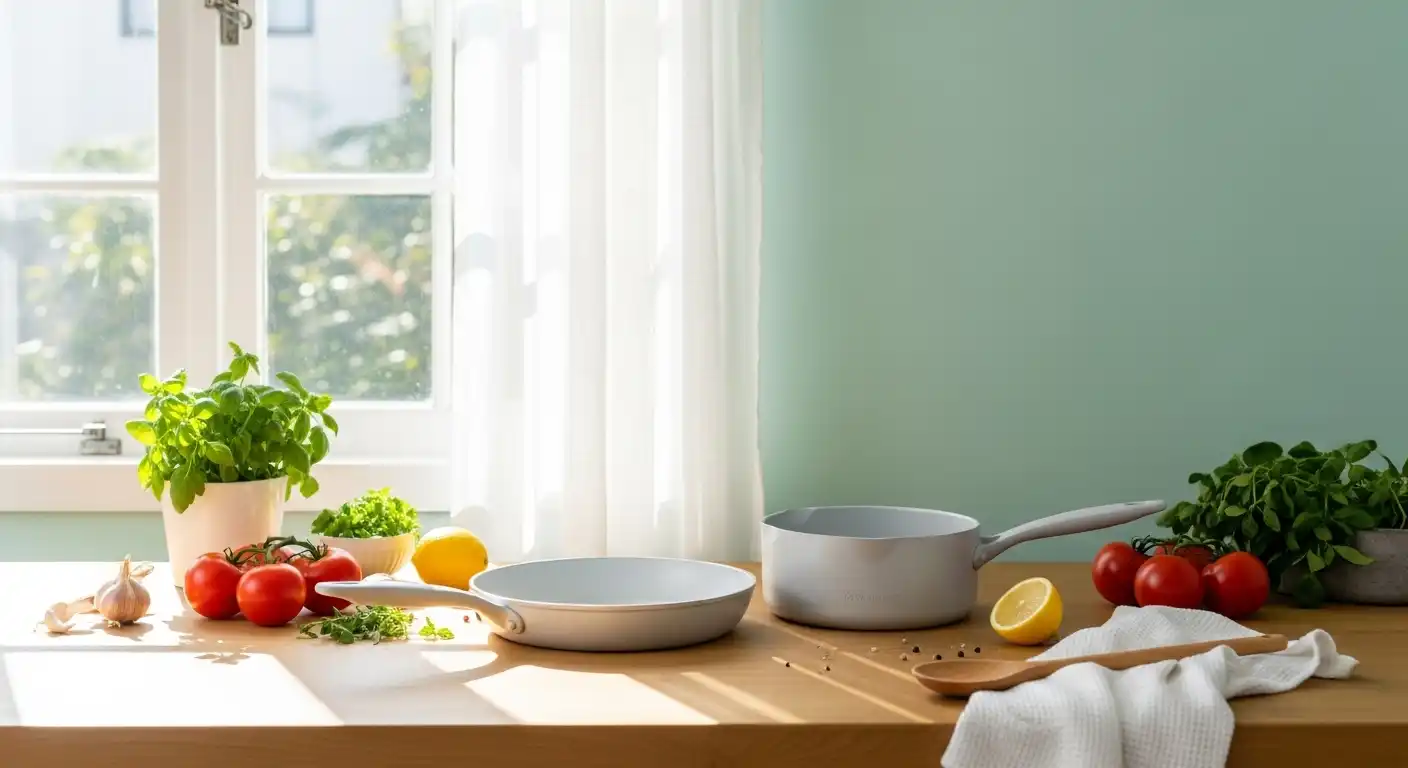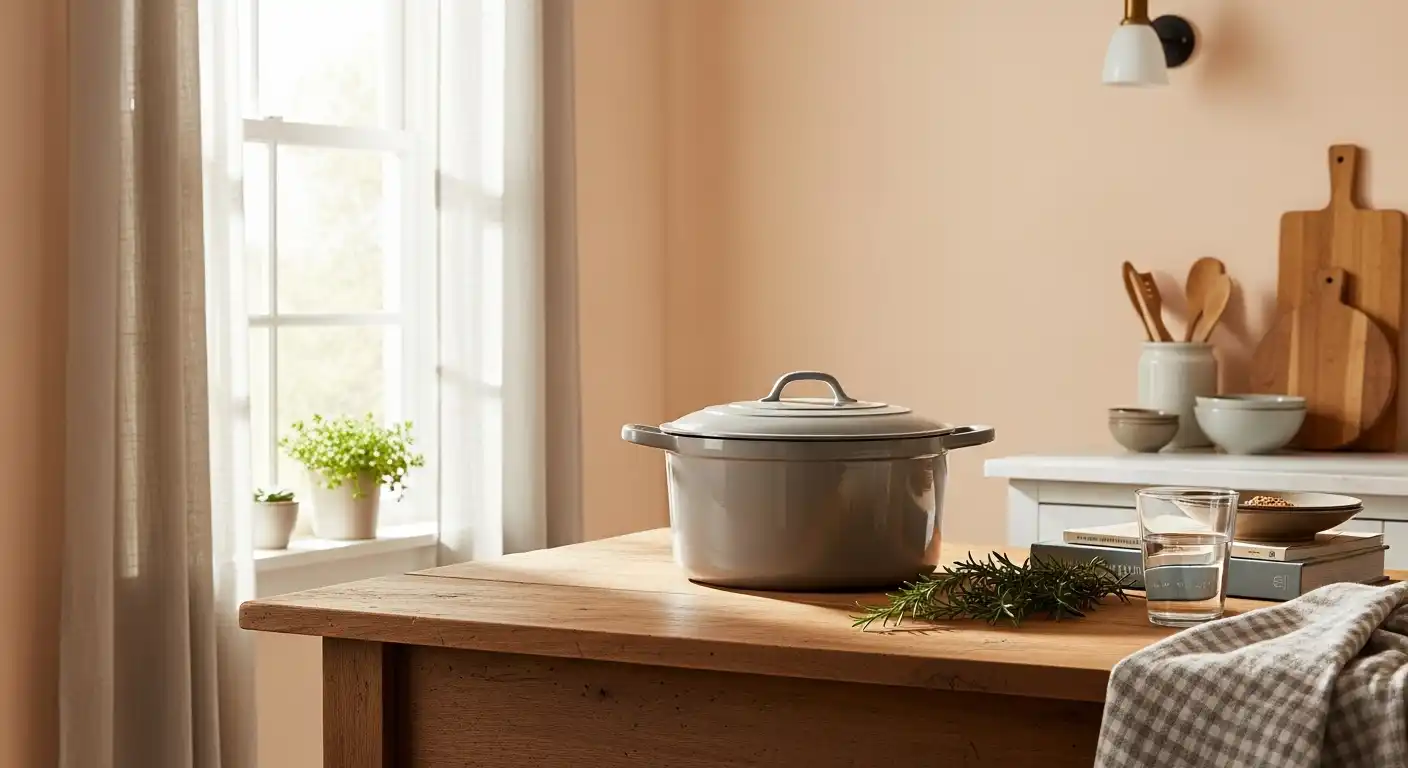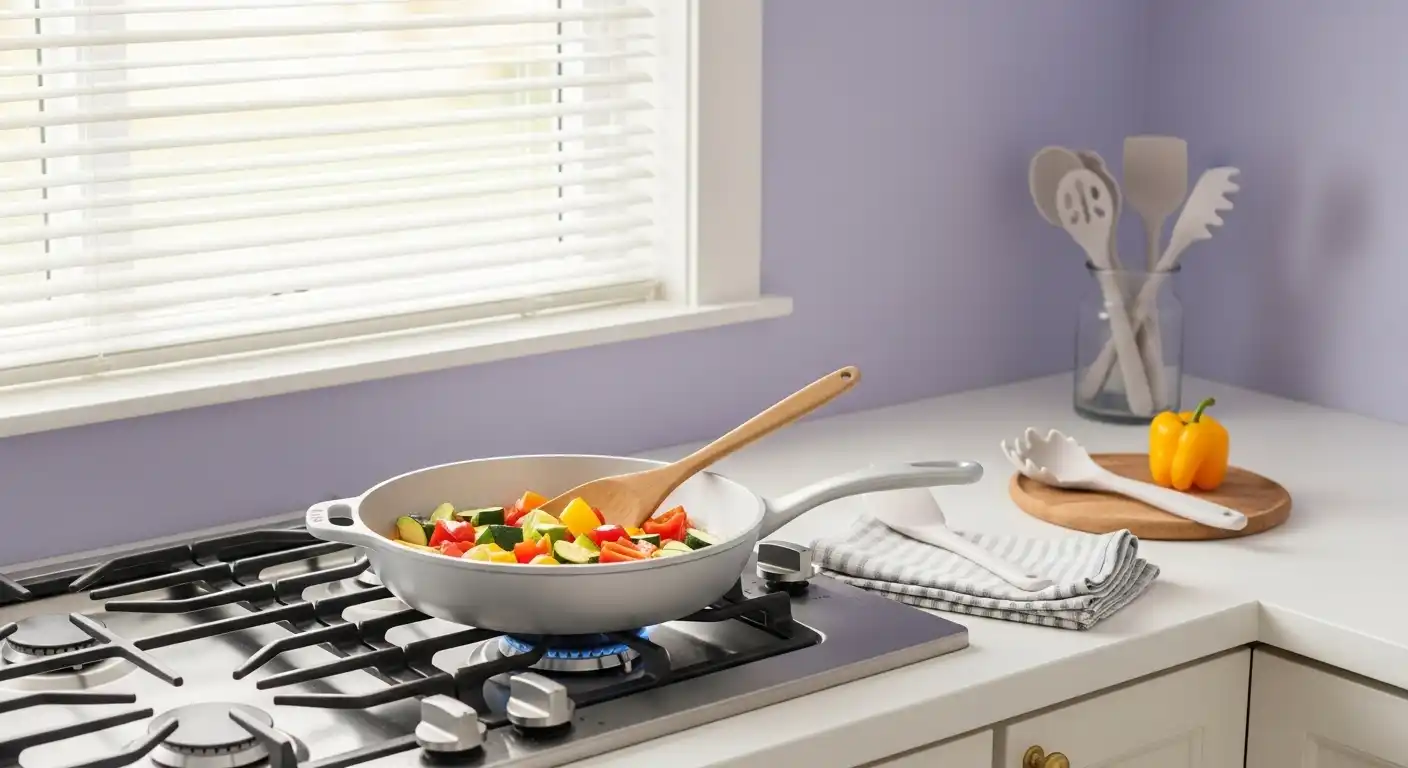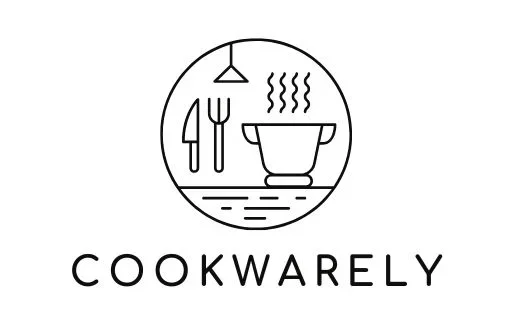Is Cast Aluminum Cookware Safe To Use?

When it comes to choosing cookware, safety is a top priority for many home cooks.
Cast aluminum cookware has gained popularity due to its lightweight design, excellent heat conductivity, and affordability.
But is cast aluminum cookware safe to use? Let’s dive into the details to understand its safety, benefits, and potential concerns.
What Is Cast Aluminum Cookware?
Cast aluminum cookware is made by pouring molten aluminum into molds, creating pots and pans with a sturdy yet lightweight structure.
🎃 Spooky Good Amazon Deals This Fall !
From cozy fall essentials to Halloween must-haves, shop Amazon’s seasonal discounts now. Don’t wait, deals vanish fast!
*As an Amazon Associate, I earn from qualifying purchases.

Unlike regular aluminum, which can be thin and prone to warping, cast aluminum is thicker and more durable.
It’s often coated with non-stick surfaces, making it a favorite for easy cooking and cleanup.
But the question remains: does this material pose any health risks?
The Safety of Aluminum in Cookware
Aluminum is a naturally occurring metal found in the earth’s crust.
Concerns about its safety stem from its potential to leach into food, especially when cooking acidic dishes like tomatoes or citrus-based sauces.

However, most cast aluminum cookware is anodized or coated with a non-stick layer, which creates a barrier between the aluminum and your food.
This significantly reduces the risk of leaching.
Studies show that the amount of aluminum that might leach into food is minimal and well below levels considered harmful by health organizations like the FDA.
Anodized vs. Non-Anodized Cast Aluminum
Anodized cast aluminum undergoes an electrochemical process that hardens the surface, making it more resistant to scratches, corrosion, and leaching.
This process enhances safety and durability.
Non-anodized aluminum, while still safe when coated, may be more prone to reacting with acidic foods if the coating wears off.
Always inspect your cookware for damage to ensure safety.
🎃 Spooky Good Amazon Deals This Fall !
From cozy fall essentials to Halloween must-haves, shop Amazon’s seasonal discounts now. Don’t wait, deals vanish fast!
*As an Amazon Associate, I earn from qualifying purchases.
For those curious about other cookware materials, check out our comparison of cast iron vs. stainless steel to see how they stack up.
Non-Stick Coatings and Their Safety
Most cast aluminum cookware comes with a non-stick coating, which raises its own set of safety questions.
Modern non-stick coatings, like PTFE (Teflon), are safe when used correctly and not overheated.
Overheating non-stick pans (above 500°F) can release fumes, which may cause temporary flu-like symptoms.
To avoid this, cook on medium to low heat and never preheat an empty non-stick pan.
If you prefer a non-stick alternative, consider a cast iron skillet that’s well-seasoned for a naturally non-stick surface.
Benefits of Cast Aluminum Cookware
Cast aluminum is lightweight, making it easier to handle than heavy cast iron cookware.
It heats up quickly and evenly, reducing hot spots that can burn food.
It’s also versatile, suitable for stovetops, including induction cooktops, as long as it’s labeled induction-compatible.
Additionally, cast aluminum is often more affordable than stainless steel or copper, offering great value for budget-conscious cooks.
Potential Concerns and How to Address Them
While cast aluminum is generally safe, there are a few considerations.
Damaged or worn coatings can expose the aluminum underneath, increasing the risk of leaching.
🎃 Spooky Good Amazon Deals This Fall !
From cozy fall essentials to Halloween must-haves, shop Amazon’s seasonal discounts now. Don’t wait, deals vanish fast!
*As an Amazon Associate, I earn from qualifying purchases.
Regularly inspect your cookware and replace any pieces with deep scratches or peeling coatings.
Avoid using metal utensils that could damage the surface.
For those worried about aluminum exposure, opt for anodized cast aluminum or explore alternatives like a cast iron Dutch oven.
How to Use Cast Aluminum Cookware Safely

To maximize safety, follow these tips:
- Avoid high heat: Stick to medium or low heat to protect non-stick coatings.
- Use soft utensils: Opt for silicone or wooden utensils to prevent scratching.
- Clean properly: Hand-wash non-stick cast aluminum to preserve the coating, avoiding abrasive sponges.
For more cleaning tips, see our guide on how to clean a cast iron wok, which shares similar principles.
Environmental and Health Considerations
Aluminum is recyclable, making cast aluminum cookware an eco-friendly choice.
However, improper disposal of damaged non-stick pans can contribute to environmental waste.
From a health perspective, the consensus is that cast aluminum cookware, when used and maintained properly, poses no significant risks.
Regulatory bodies like the World Health Organization have set safe daily intake levels for aluminum, and cookware use falls well within these limits.
Cast Aluminum vs. Other Cookware Materials
How does cast aluminum compare to other options? Unlike cast iron skillets, which require seasoning and can be heavy, cast aluminum is low-maintenance and easy to handle.
🎃 Spooky Good Amazon Deals This Fall !
From cozy fall essentials to Halloween must-haves, shop Amazon’s seasonal discounts now. Don’t wait, deals vanish fast!
*As an Amazon Associate, I earn from qualifying purchases.
Compared to stainless steel, cast aluminum offers better heat distribution but may not be as durable in high-heat scenarios.
For high-heat cooking, consider if a cast iron skillet can go in the oven.
If you’re deciding between a wok vs. a cast iron skillet, cast aluminum woks are lighter but may not retain heat as well.
Common Myths About Cast Aluminum Cookware
One myth is that all aluminum cookware is dangerous due to Alzheimer’s disease concerns.
Research has largely debunked this link, showing no clear connection between aluminum exposure from cookware and neurological conditions.
Another misconception is that non-stick coatings are inherently toxic. Modern coatings are safe when used within recommended temperature ranges.
For those curious about cookware safety, our post on is black residue on cast iron skillets harmful addresses similar concerns.
Who Should Use Cast Aluminum Cookware?
Cast aluminum is ideal for home cooks who value convenience, affordability, and versatility.
It’s great for everyday tasks like sautéing, frying, or simmering sauces.
However, if you frequently cook highly acidic foods or prefer high-heat searing, you might want to pair it with a cast iron skillet for those tasks.
It’s also a good choice for those with glass-top stoves, as its flat base ensures good contact.
Maintenance and Longevity
To extend the life of your cast aluminum cookware, avoid dishwashers, as harsh detergents can degrade non-stick coatings. Store pans carefully to prevent scratches.
🎃 Spooky Good Amazon Deals This Fall !
From cozy fall essentials to Halloween must-haves, shop Amazon’s seasonal discounts now. Don’t wait, deals vanish fast!
*As an Amazon Associate, I earn from qualifying purchases.
Regular maintenance keeps your cookware safe and effective.
If you’re transitioning from cast iron, check out how to store food in cast iron cookware for tips on proper care.
Conclusion: Is Cast Aluminum Cookware Safe To Use?
In summary, cast aluminum cookware is safe to use when handled properly.
Anodized or non-stick coated options minimize health risks, and modern manufacturing standards ensure safety.
By following best practices—like using low to medium heat, inspecting for damage, and using soft utensils—you can enjoy the benefits of cast aluminum without worry.
Whether you’re a beginner or a seasoned cook, cast aluminum offers a reliable, budget-friendly option.
If you’re exploring other cookware, consider reading about how often to replace a cast iron skillet for a well-rounded kitchen setup.
